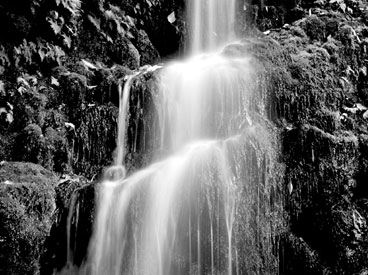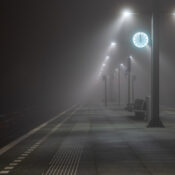For the next two days, Jimmy did nothing. Except for his daily trip to therapy, he lay motionless in bed, sat motionless in the wheelchair. He couldn’t stop thinking of Maria. He knew she’d had no family; it was one of the bonds between them. Both were alone and far from home. One of the nurses told him there would be a funeral service here in the hospital, burial in a nearby cemetery.
And then, that night, Jimmy had a dream. Maria was standing beside him at the window at the end of the ward, holding his hand and smiling. He knew she was smiling because he could see her now, could see her and the sunshiny wrinkles on her face and the roaring waterfall and the rest of the world beyond the window glass. And it was as spectacular as she’d said it would be.
The following day Jimmy pushed his chair, unseeing but knowing exactly where he was, farther toward the window. And the day after that. And the day after that. The orderlies, in on his secret now, helped him roll back to his bed after each effort.
On August 30 he leaned forward, groping with outstretched fingers, and touched the windowsill. The noise of the falls was louder now. He was there.
As promised, the doctors came on the 31st to remove his bandages. Before they did, he asked them to stand aside, and to their amazement he slowly wheeled himself to a point in front of the window. Sitting there as the bandages were unwrapped, he thought he could already feel the peace and serenity the old woman had predicted.
He’d done it. He had attained his goal, her goal. He was not yet healed but he was on his way, in both body and mind, and was about to witness what he’d anticipated for so long.
And then it was time. The bandages were off.
He opened his eyes.
At first he saw nothing but brightness. Then colors, shapes, images. He saw for the first time the beaming faces of his doctors and nurses, his pale arms, his hospital-gowned body, the walls and floor and beds of his ward.
But when he looked out the window—
“Where’s the waterfall?” He swiveled his head, his eyes searching. “The lake, the trees?”
The doctor frowned. “Waterfall?” He turned to follow Jimmy’s gaze.
The view from the window was all gray buildings. Gray buildings, with a swatch of gray river beyond. The steady roar in the distance, Jimmy realized now, was machinery of some kind. Maybe a factory, or a treatment plant.
Jimmy’s eyes, their sight newly restored, closed again. Tears spilled down his cheeks and onto his white gown.
…
“She lied to you,” Susan murmured.
Jimmy turned to face her. She sat there in the soft grass and stared at him, stared as only she could, with those magical green eyes. How he loved those eyes.
He and Susan Shelby had been together seven months now. They’d met at a showing of his paintings at a California gallery, almost three years after his recovery. She was good to him and for him. He felt a twinge of guilt for waiting until now to tell her all this. But he’d never told anyone.
Jimmy shook his head. “She didn’t lie. She told me what she thought was true.”
“What do you mean?”
“Maria Renaldo, I discovered, was no hospital worker. No volunteer. She was just another patient. The fifth floor was the psychiatric ward.”
Susan blinked. “She was crazy?”
“By our standards she was. Had been for years.”
“But even if she was … delusional,” Susan said, “she’d know there was no lake there. She could see—”
“No. She couldn’t.”
“What?”
“She was blind,” Jimmy said.
He’d found this out later also, from one of the staff. Maria had indeed spent some time in the same ward, following a fall, and had sat for hours in her own wheelchair in front of the big window at the end of the room. That much was true. But she saw nothing from the window. She’d already been blind for years, ever since a bus accident after moving north from Bolivia.
“Bolivia?” Susan asked. Her eyes were wide now.
Jimmy nodded. “Turned out the cop was right. I did settle with the truck’s company, for a boatload of money. I used some of it to find out about Maria’s family and to come here.”
Susan looked around as if seeing the lush Bolivian countryside for the first time. “Here? To this spot?”
“Look behind you,” he said.
She turned and gasped. Set into the grass of the hillside three feet away was a small white headstone, still shiny. On it were the words “Maria Consuela Renaldo 1923-2008—The Work of Angels.”
“But you said she was buried in Oregon—”
“I said she died in Oregon. The nurse was wrong about the burial. Maria was cremated; her ashes were stored there. I brought them here, a year ago. Along with this stone.”
A silence passed.
“Why here?” Susan asked.
“Two reasons. One is, her niece and nephew live in a house just down that path. She had family after all.”
“And the other?”
“She was born here,” Jimmy said. “Come with me.”
Together they climbed the 30 feet to the top of the hill. “What’s that sound?” Susan said, as they neared the crest.
Instead of speaking, he stopped and pointed. In the wooded valley beyond was a blue lake and a foaming waterfall. It growled like distant thunder in the stillness.
Susan put a hand over her mouth. Tears gleamed in her eyes. “It’s the painting. The one in your den.”
He just nodded.
For a long moment neither of them moved or spoke. Finally she took his arm and leaned her head onto his shoulder. The shadows were longer now, the jungle quiet.
Below them, almost lost in the soft twilight, the falls roared.
Become a Saturday Evening Post member and enjoy unlimited access. Subscribe now



